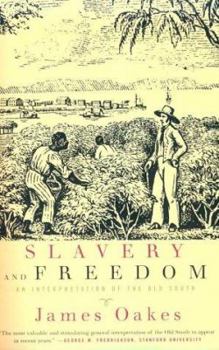Slavery and Freedom: An Interpretation of the Old South
Select Format
Select Condition 
Book Overview
This pathbreaking interpretation of the slaveholding South begins with the insight that slavery and freedom were not mutually exclusive but were intertwined in every dimension of life in the South. James Oakes traces the implications of this insight for relations between masters and slaves, slaveholders and non-slaveholders, and for the rise of a racist ideology.
Format:Paperback
Language:English
ISBN:0393317668
ISBN13:9780393317664
Release Date:May 1998
Publisher:W. W. Norton & Company
Length:272 Pages
Weight:0.60 lbs.
Dimensions:0.6" x 5.5" x 8.2"
Customer Reviews
2 ratings
A Seminal Synthesis of Scholarship
Published by Thriftbooks.com User , 15 years ago
Slavery and Freedom: An Interpretation of the Old South. By James Oakes. (New York: Alfred A. Knopf, 1990. Pp. xxii, 246. $22.95.) In Harriet Beecher Stowe's novel, Mrs. Bird asks, "What could induce you to leave a good home, then, and run away, and go through such dangers? The woman [Eliza] looked up at Mrs. Bird, with a keen, scrutinizing glance...` Ma'am,' she said, suddenly, `have you ever lost a child?"' In this telling scene between Eliza and a northern woman who helps her, Stowe struck the moral cord in the hearts of many middle-class, religious families. The destruction of the slave family is one repeatedly analyzed by historians and typically placed among one of the most destructive affects of the peculiar institution. Recently, micro-analysis works such as, "The African-American Family" (1998) by Leslie Owens, have successfully divorced the individual from society, losing its linkage to the bigger picture. In James Oakes' second book, Slavery and Freedom, Oakes declares that the destruction of the slave family is ultimately a result of slaves being `outsiders' from Southern society. Oakes, in a similar light to works such as the eminent historian Kenneth Stampp's Peculiar Institution, examines fundamental questions of Southern antebellum history, the structure of slavery, the relationship between slaves and their masters, as well as the politics of slavery. Oakes argues, "This is not a study of the origins of the Civil War so much as the "southern road" to it...These, then, are essays in interpretation, frankly exploratory and by intent suggestive rather than definitive." (xx) Oakes convincingly argues that since slavery is always defined as the complete denial of freedom within a society; freedom is "inescapably" tied to the way a society defines slavery. Drawing on lessons learned from other `slave societies' such as ancient Greece and Rome, Oakes writes that the Old South's slavery touched every aspect of life in the south. "It dominated the social structure, drove the economy, and permeated the political system." (40) By the time of the American Revolution, the North and South were at the crossroads of exceptionalism; yet as Oakes writes, "New World slavery was itself the servant of the driving force of capitalism." (52) As Oakes writes, "American masters were the first in history whose power depended on commercial relations with a capitalist world that was ultimately more powerful than all the slave societies put together." (53) A cogent idea, Oakes lauds the fugitive slaves for forcing change in America and ultimately bringing freedom to four million enthralled peoples. He writes that the reality of fugitives brought the Northern `liberty laws' face-to-face with the Constitutions protection of property. Slave resistance, in the form of runaways, according to Oakes, is ultimately what helped divide the nation toward war and emancipation. Oakes writes, "Many citizens who were perfectly prepared to defend th
Excellent view of the Old South
Published by Thriftbooks.com User , 24 years ago
I was really impressed with the unbelievable wealth knowledge Professor Oakes brings to light in this book. I recommend it be used in high schools throughout the country. Everyone should have access to this information. I knew him from Northwestern University. Thanks Dr. Oakes.





